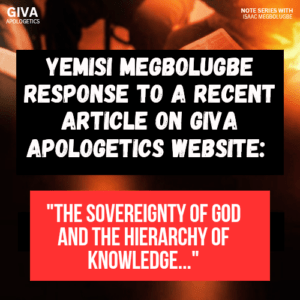
Yemisi Megbolugbe response to a recent article on GIVA Apologetics Website:
“The Sovereignty of God and the Hierarchy of Knowledge……..
Isaac Megbolugbe
March 4, 2025
This article beautifully articulates the intricate relationship between the sovereignty of God and the hierarchy of human knowledge. The perspective that all knowledge originates from God’s omniscient mind, with engineering positioned near the practical reality end, provides a profound understanding of how different disciplines contribute to the tapestry of human understanding.
The call for engineers to recognise and collaborate with those engaged in higher-level reasoning is particularly insightful. By acknowledging the broader implications of their work and integrating it into the larger context of human understanding, engineers can transcend their limitations and contribute more holistically to society. This is a biblical perspective only that people from other worldviews do not embrace or engage with.
Nevertheless, in recognizing God’s sovereignty as the ultimate source of all knowledge, how can individuals from various fields of study and practice work together to ensure a more holistic understanding of our world? What role can educational institutions play in fostering this kind of interdisciplinary collaboration and appreciation for different levels of abstraction?
Response from Isaac Megbolugbe
Fostering Interdisciplinary Collaboration: A Call to Action
In response to Yemisi’s question, it’s essential to recognize that acknowledging God’s sovereignty as the ultimate source of all knowledge is crucial in fostering interdisciplinary collaboration. By embracing this understanding, individuals from various fields can work together to achieve a more holistic understanding of our world. Unfortunately, there are many worldviews that fundamentally reject the biblical perspective that acknowledges the sovereignty of God and that is the rub against our aspiration of holistic understanding and practice.
Breaking Down Silos
Educational institutions play a vital role in promoting interdisciplinary collaboration. They can:
1. Encourage cross-disciplinary courses and programs
2. Facilitate dialogue between students and faculty from diverse backgrounds
3. Foster a culture of humility and recognition of the hierarchy of knowledge
Integrating Levels of Abstraction
Individuals can:
1. Recognize the value of different levels of abstraction
2. Engage in open communication and knowledge-sharing
3. Embrace a holistic approach to problem-solving
Collaborative Research and Practice
By working together, individuals from various fields can:
1. Develop more comprehensive solutions
2. Address complex problems from multiple angles
3. Advance human understanding and contribute to societal progress
Conclusion
In acknowledging God’s sovereignty as the ultimate source of all knowledge, we can transcend disciplinary boundaries and work towards a more holistic understanding of our world. Educational institutions and individuals must foster interdisciplinary collaboration, recognizing the value of different levels of abstraction and promoting a culture of humility and knowledge-sharing. Together, we can achieve a deeper understanding of God’s creation and our place within it.